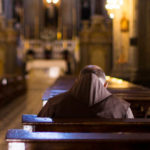We run our website the way we wished the whole internet worked: we provide high quality original content with no ads. We are funded solely by your direct support. Please consider supporting this project.
When You Doubt the Bible
Many people enter into conversations with ReKnew and Greg’s writings because they have questions and doubts about the Bible which they do not feel they can ask within their current church tradition. When they arise, and they will, what do we do with them? How do we process them in a healthy way? The following is an excerpt from Greg’s latest book Benefit of the Doubt where he shares how he shifted from engaging the Bible as a house of cards to engaging the Bible in order to relate to the foundation of the Bible, Jesus Christ:
“Have you ever seen a really intricate house of cards? They are structures that are erected by leaning playing cards against one another. … The house as a whole depends on each and every card staying in place. If any card is removed, the whole thing collapses.
This is quite a bit like the way my early faith was held together, and I’ve found that it’s more or less the way most evangelicals embrace faith. … If any [beliefs] were removed, the whole edifice of our theology flattened out like a pancake.
The same thing can be applied to Scripture. … I was taught that if the earth was not created in six literal days and if Adam and Eve were not literal, historical people, then the whole Bible may as well be a book of lies. Flick this one card out, and the whole structure of faith collapses. When I began to question how old the earth was and how humans came into being, I may as well have been calling into question the historical evidence of Jesus.
And the same thing applied to every single passage of Scripture. Since we were taught that it had to be absolutely “inerrant” to be God’s Word, our faith in it could be destroyed by one verse being proved to contain a mistake. The Bible was itself a house of cards. …” (157-158)
From a House of Cards Faith to The Foundation of Christ
“The all-important center of the Christian faith is not anything we believe; it’s the person of Jesus Christ, with whom we are invited to have a life-giving relationship. … Everything began to change for me several decades ago when I began to realize that I didn’t need to rely on the Bible as the inspired Word of God in order to enter into this relationship with Christ. Rather than believing in Jesus because I believe the Bible to be the inspired Word of God, as evangelicals typically do, I came to believe the Bible was the inspired Word of God because I first believed in Jesus. This is how I now encourage people to structure their faith, for I have found it to be a much surer intellectual foundation for my faith than the conviction that Scripture is the Word of God. …” (159)
“Whereas Islam has always presented itself as a ‘religion of the book,’ the kingdom of God has been from the start a movement that is centered on a person. The only foundation that can be laid, Paul says, for example, is ‘the one already laid, which is Jesus Christ (1 Cor. 3:11). …
The earliest disciples certainly believed the Old Testament was inspired, but they never based their faith in Christ on this. They used it extensively, but only as a means of pointing people to Jesus, whom they already believed in for other reasons. This is the rule that I believe the Bible, which now includes the New Testament, should play in our lives. …
Hence, I don’t see beliefs rooted in Scripture as an end in and of themselves. They rather point us to Jesus and help bring us into, and strengthen us in, our relationship with Jesus. The moment we begin to think that Scripture or our beliefs are ends in and of themselves, we are in danger of making an idol of Scriptures and our beliefs” (163).
Category: General
Tags: Benefit of the Doubt, Bible, Doubt, Faith
Related Reading

Rethinking Our View of Faith
The second conviction of the “ReKnew Manifesto” is that we need to rethink what it means to have faith. It’s my impression that many, if not most, Evangelical Christians associate their assurance that they’re “saved” with their confidence that they believe correct doctrines. This is why many, if not most, think that heretics who believe…

What Does ‘Your Faith Has Healed You’ Mean? (podcast)
Greg discusses faith, doubt, and healings. Episode 486 http://traffic.libsyn.com/askgregboyd/Episode_0486.mp3

Still Forming
Hi Everyone, The Open Theism conference was a huge blessing for us. We’ll be talking more about that in the coming days and giving you information on how to access video of some of the speakers. But today we wanted to share something about spiritual formation and a very old way of reading the Bible…

5 Ways the Bible Supports Open Theism
Open Theism refers to the belief that God created a world in which possibilities are real. It contrasts with Classical Theism which holds that all the facts of world history are eternally settled, either by God willing them so (as in Calvinism) or simply in God’s knowledge (as in Arminianism). Open Theists believe God created humans and…

On Biblical Interpretation
chad via Compfight Today we’re linking to a blog post from Rachel Held Evans about Biblical interpretation. In her post, Rachel writes about the complexities Christians encounter when our scriptural interpretations differ (emphasis is Rachel’s): What is perhaps most frustrating about engaging in such conversations within the evangelical community in particular, however, is that differences…

The Old Testament Is NOT on the Same Plane as the New Testament
Paul taught that unbelievers are blinded by “the god of this age” when they read the OT such that “their minds are made dull” and a “veil covers their hearts…when the old covenant is read” (2 Cor. 4:4; 3:14-15). This is why they are unable to see “the light of the knowledge of God’s glory…

